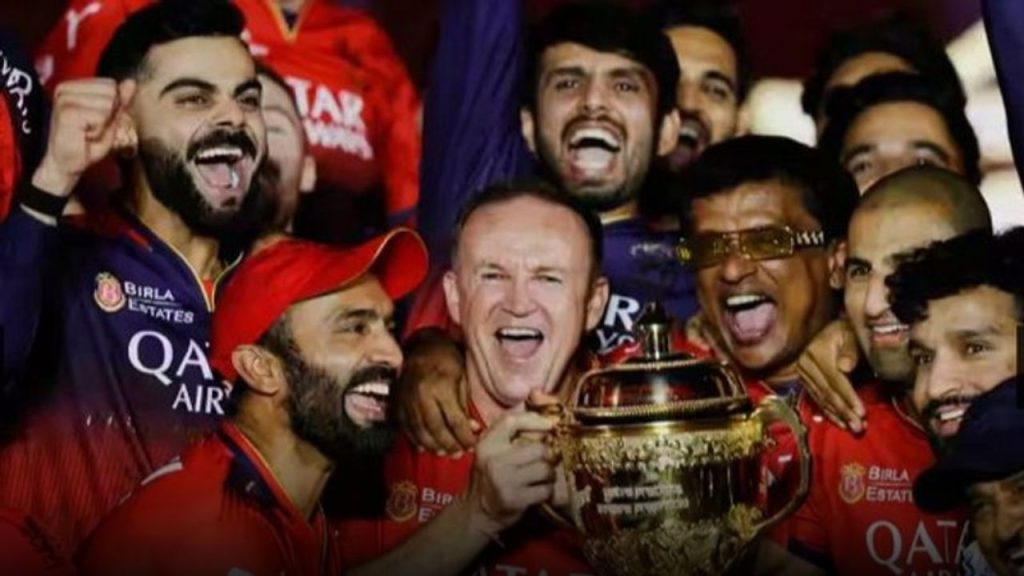Under Andy Flower’s guidance as head coach, RCB ended their long wait by defeating Punjab Kings to win their first-ever IPL title on Tuesday.
Andy Flower’s Transformative Year at RCB: From Near-Misses to IPL Glory

Over a year ago, when Andy Flower took over as head coach of Royal Challengers Bengaluru, the team was still haunted by years of near-misses and unfulfilled potential. Meanwhile, RCB’s women’s team had just clinched their maiden Women’s Premier League title under Smriti Mandhana. Rather than feeling pressured, Flower embraced the challenge, saying it was a major reason he accepted the role.
“It is one of the main reasons I wanted to take this job,” he told Hindustan Times last year. “It gives me a very exciting opportunity to see if we can do something special with RCB.”
Flower’s focus on the title was clear from the start, and one year later, he delivered on that promise.
For a franchise long defined by flamboyant stars, passionate fans, and heartbreaks, Andy Flower’s arrival marked a fundamental shift — not just in results, but in mindset. He emphasized “simplifying” the process both on and off the field. After the 2024 season, he rebuilt the team’s approach from the ground up, moving away from relying on legacy stars and instead focusing on clarity of roles and tactical flexibility.
RCB had often leaned on big names like Virat Kohli, AB de Villiers, and Chris Gayle, a glittering but often unbalanced lineup lacking depth. But under Flower’s guidance, the 2025 auction reflected a clear break from this past. Despite top Indian players like Rishabh Pant, KL Rahul, and Shreyas Iyer being available, RCB chose to build a squad around versatile, experienced, and strategically fitting players—proving that success can come from smart planning rather than just star power.
𝘐 𝘶𝘴𝘶𝘢𝘭𝘭𝘺 𝘸𝘪𝘯 𝘵𝘩𝘪𝘯𝘨𝘴 𝘪𝘯 𝘮𝘺 𝘴𝘦𝘤𝘰𝘯𝘥 𝘺𝘦𝘢𝘳. 😎
— Royal Challengers Bengaluru (@RCBTweets) June 4, 2025
Sir Andy Flower. 🫡 pic.twitter.com/pymBSmSlHA
RCB focused on building a strong Indian core with players like Krunal Pandya, Jitesh Sharma, Bhuvneshwar Kumar, and Suyash Sharma, while placing their trust in overseas talents such as Phil Salt, Josh Hazlewood, Tim David, and Romario Shepherd. Though not headline-grabbing signings, each player was carefully chosen with a clear strategy in mind, playing crucial roles throughout RCB’s championship-winning campaign.
“I thought we did beautifully in picking a very balanced squad, knowing what sort of players we want and which player would fit in which role. As we were picking the team, we used to put players in certain roles and see how they fit,” said Dinesh Karthik, the team’s mentor, reflecting on their thoughtful approach.
Big calls, bigger returns

RCB shocked many by letting go of Will Jacks at the auction—a gutsy call that paid off as Phil Salt delivered a series of explosive starts, justifying the faith placed in him.
The backroom staff’s strategy extended beyond the auction. When Devdutt Padikkal was sidelined by injury, they brought in seasoned campaigner Mayank Agarwal, whose unbeaten 41 in a crucial chase alongside Jitesh Sharma’s whirlwind 85* validated their choice. In the final, though most RCB batters played cautious, Mayank’s crucial 24 helped steady the innings.
Off the field, Andy Flower and mentor Aakash Chopra focused on creating a supportive environment. As Chopra explained, “For Andy and I, creating a sort of environment where people feel safe, backed, and accountable for their own decisions, and able to showcase their strengths — that’s the key.”
One of the boldest moves was appointing Rajat Patidar as captain, despite his lack of prior leadership experience at this level. But Patidar grew into the role, commanding respect through calm consistency.
Flower and his team deliberately avoided dependence on one or two leaders, fostering a balanced side where different players stepped up in different matches. This approach kept RCB composed under pressure—whether bouncing back from early losses, surviving tight chases, or defending modest totals.
This title was not just a triumph for RCB—it was a vindication for Andy Flower and his system: the right people, the right roles, and the right mindset. It all began with Flower’s belief that taking on a title-less side was an “exciting” challenge—a hunger that ultimately made all the difference.


